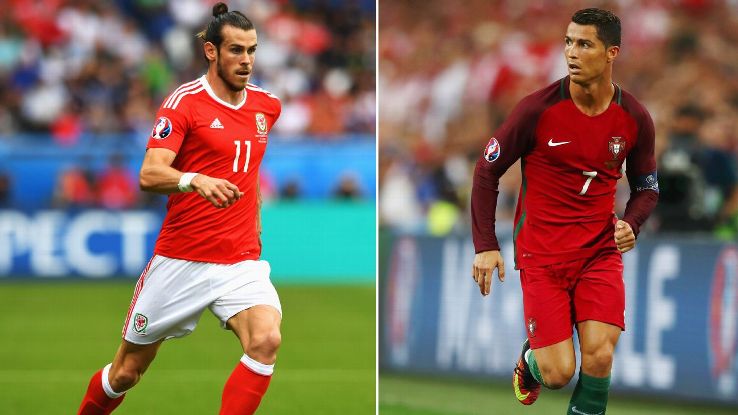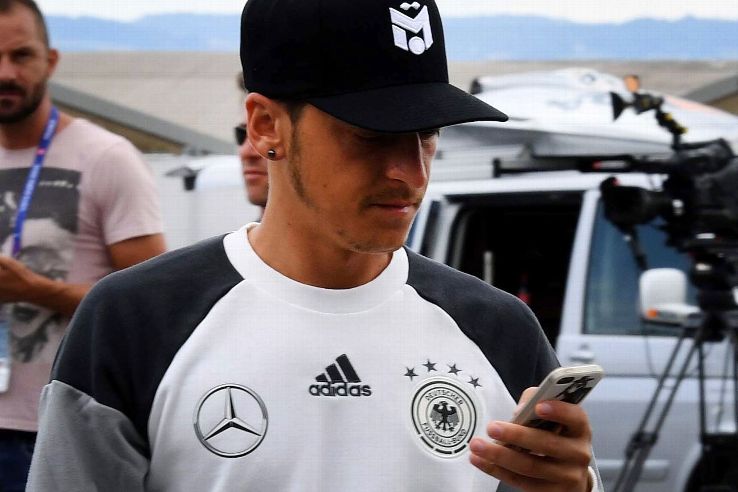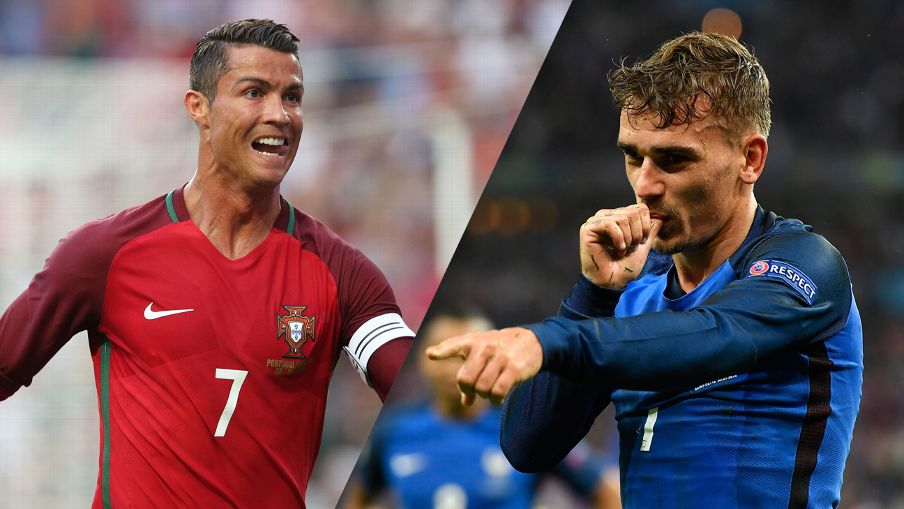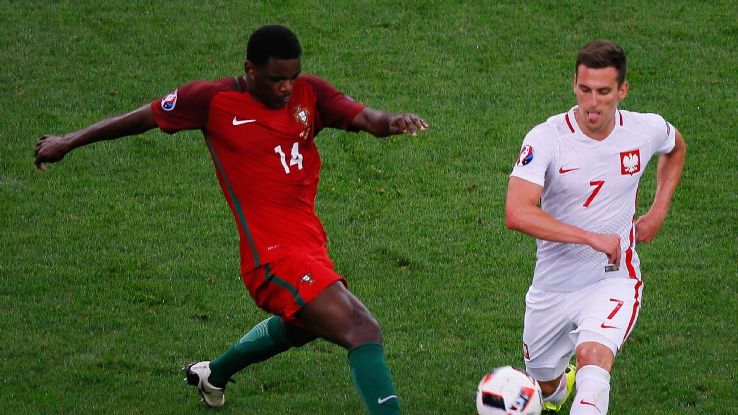- Joined
- Jul 14, 2008
- Messages
- 89,718
- Points
- 113
By Gabriele Marcotti
from espnfc.com
You can't escape it: Portugal vs. Wales is all about Ronaldo and Gareth Bale
PARIS -- Let's be clear here. And, hopefully, either not contradict ourselves or figure out a way to live with the contradiction.
Odds are, neither Wales' Gareth Bale nor Portugal's Cristiano Ronaldo will carry their countries on their back to the European Championship. It takes more than one guy. In fact, it takes a village.
Theoretically, it's possible to be a one-man team. But there's been little to suggest it will work out that way in this tournament, based on Ronaldo's form and Bale's role in Chris Coleman's setup. Nope, more than likely, this will be a collective effort.
So why view this semifinal between Wales and Portugal, which takes place on Wednesday in Lyon, through the lens of the two most expensive players in football history? Mainly because it's a study in contrasts and similarities, a chiaroscuro of what we expect from our superstars who also happen to be teammates at Real Madrid.
Begin with the common ground, starting with the transfer fee that took them to the Bernabeu. Depending on historical exchange rates, depending who you believe, depending on bonus structures and agent commissions, one may have been more or less expensive than the other. Or maybe they cost exactly the same.
What we do know is that both cost substantially more than any other footballer in history.
There's also the physical appearance. Tall, long-limbed, freakishly athletic men with proportionately muscular frames, the kind Leonardo Da Vinci might have doodled. Both blessed with quick feet, an eye for goal and prodigious leaping ability not usually associated with guys who start out as wide players. Both with a distinctive "look" that make them stand out among their colleagues.
While Bale and Ronaldo have been highly touted and scouted from a very young age, each had his distinctive moment when he announced himself on the global stage, transitioning into the consciousness of marginal and casual fans.
For Ronaldo, it was the 2004 European Championships. He arrived at the tournament as a young potential game-changer off the bench, the teenager on a host nation filled with top-tier veterans like Deco, Manuel Rui Costa, Simao and Luis Figo. He ended in the Best XI / Team of the Tournament, scoring two goals, delivering two assists and establishing himself as a starter by the third game.
You can argue about Bale's first big moment, but many would choose the two games against Rafa Benitez' Inter Milan in the 2010-11 Champions League. He was 21 at the time and, similarly, Bale's performances for Tottenham underscored just how unplayable he could become. You can find highlights on YouTube but, in some ways, this animation captures the spirit of those nights even better.

From there, things tend to diverge. Partly due to injury, partly because he played for smaller clubs before joining Real Madrid, partly because he's Welsh and didn't get to a major tournament until this summer, Bale -- who turns 27 in less than two weeks -- has enjoyed less of the limelight and won substantially fewer trophies than Ronaldo when he was of a similar age. The Portuguese forward had won three league titles, a Champions League, two domestic cups and a Ballon d'Or by the time he turned 27, plus he had played in two World Cups and two European Championships.
There's little question that, in terms of hype and media attention, Ronaldo is bigger than Bale. The Welshman may have officially trademarked his heart celebration, but when it comes to commercial oomph, he's a mom-and-pop affair relative to Cristiano, Inc.
Bale also retains a certain air of mystery -- at least relative to Ronaldo, who is continually dissected in the petri dish of public opinion and seems to thrive in the spotlight, whether it's producing a documentary film about himself or chronicling his adventures with Moroccan-Dutch kickboxer Badr Hari on social media. The fact that he is inextricably intertwined with you-know-who when it comes to actual football doesn't help Ronaldo either. The Messi-Ronaldo dichotomy inevitably means Ronaldo turns off a large chunk of Barca-leaning neutrals.
Bale has no such problems. He bides his time and plays second fiddle to Ronaldo at club level and (bar for an incident in 2014-15, when his agent, Jonathan Barnett, spoke up on his behalf) seems entirely comfortable with it.
We're so used to seeing them in a club context that the Euros has made for a refreshing treat, especially for those a little weary of the predictable dominance of Super Clubs. What might they be like without a star-studded supporting cast ... and without each other?
It's not a knock on Portugal or Wales. This Portugal team, caught in the seams of a generational shift, is perhaps the weakest of the Cristiano-era. With William Carvalho suspended, Ronaldo, Nani, Pepe and Joao Moutinho could be the only starters who made the trip to the 2014 World Cup in Brazil (and Moutinho, of course, was dropped for the last two games). As for Wales, this may be the most talented side in a long time, but, with all respect, it's still Wales, a country that had not qualified for a major tournament since 1958.
What this means for both Bale and Ronaldo is that not only do they need to take on the usual burden of leadership and stardom, they also have to do it while surrounded with players who are nowhere near as gifted as the teammates they're used to. Simply put, they have to give more. A lot more.
And, so far, that's what they've done. Bale may have been Wales' best player, but he has also proved invaluable at making those around him better, which is what you expect from your superstar. His movement, passing and selflessness have helped turn his full-backs into legitimate wide threats, Joe Allen into someone who doesn't make the "Welsh Xavi" comparison sound quite so blasphemous and Aaron Ramsey (who is suspended against Portugal) into a driving force from the middle of the park. And, of course, Hal Robson-Kanu into a guy who can deliver a Cruyff-like turn and score the kind of goal they'll be talking about for ages.
Ronaldo has had a more difficult time making his teammates better during this tournament for a number of reasons. For a start, his task is different. He's effectively been asked to be the offensive terminus and provide the goals, with the rest of the team at his service. He's done it intermittently, missing chances you'd expect a man who has scored more than 350 goals for club and country in the past six seasons to bury in the back of the net. When the goals don't go in, it's tougher for Ronaldo -- in this role -- to make himself useful: he can't start rampaging around the midfield, or run himself into the ground chasing fullbacks, leaving the frontline unmanned. All he can do is sit, find space in the box and trust that his teammates will deliver chances.
Actually, that's not quite right. He can do more, but it's stuff we don't normally see, though we did get a glimpse during the penalty shoot-out against Poland. Ronaldo took it upon himself to talk to Moutinho and get him to take a penalty. Not that Moutinho is some kid; he's a guy who has played for Portugal for the past 11 years and boasts 88 caps. He's meant to be one of the leaders of this team, but he was dropped from the starting XI after a poor group stage and was low on confidence. This is what leaders do. This is what Cristiano did.
If Wales and Portugal have arrived this far, to the semifinals of Euro 2016, make no mistake, a lot of it is down to Bale and Ronaldo. And not just for what they've done on the pitch, but for what they've done -- and come to symbolize -- off it, in the privacy of the training camp.
Teams like these don't get this far on the back of superstars. They do it on the backs of leaders of men and 23 minds acting as one.
from espnfc.com
You can't escape it: Portugal vs. Wales is all about Ronaldo and Gareth Bale
PARIS -- Let's be clear here. And, hopefully, either not contradict ourselves or figure out a way to live with the contradiction.
Odds are, neither Wales' Gareth Bale nor Portugal's Cristiano Ronaldo will carry their countries on their back to the European Championship. It takes more than one guy. In fact, it takes a village.
Theoretically, it's possible to be a one-man team. But there's been little to suggest it will work out that way in this tournament, based on Ronaldo's form and Bale's role in Chris Coleman's setup. Nope, more than likely, this will be a collective effort.
So why view this semifinal between Wales and Portugal, which takes place on Wednesday in Lyon, through the lens of the two most expensive players in football history? Mainly because it's a study in contrasts and similarities, a chiaroscuro of what we expect from our superstars who also happen to be teammates at Real Madrid.
Begin with the common ground, starting with the transfer fee that took them to the Bernabeu. Depending on historical exchange rates, depending who you believe, depending on bonus structures and agent commissions, one may have been more or less expensive than the other. Or maybe they cost exactly the same.
What we do know is that both cost substantially more than any other footballer in history.
There's also the physical appearance. Tall, long-limbed, freakishly athletic men with proportionately muscular frames, the kind Leonardo Da Vinci might have doodled. Both blessed with quick feet, an eye for goal and prodigious leaping ability not usually associated with guys who start out as wide players. Both with a distinctive "look" that make them stand out among their colleagues.
While Bale and Ronaldo have been highly touted and scouted from a very young age, each had his distinctive moment when he announced himself on the global stage, transitioning into the consciousness of marginal and casual fans.
For Ronaldo, it was the 2004 European Championships. He arrived at the tournament as a young potential game-changer off the bench, the teenager on a host nation filled with top-tier veterans like Deco, Manuel Rui Costa, Simao and Luis Figo. He ended in the Best XI / Team of the Tournament, scoring two goals, delivering two assists and establishing himself as a starter by the third game.
You can argue about Bale's first big moment, but many would choose the two games against Rafa Benitez' Inter Milan in the 2010-11 Champions League. He was 21 at the time and, similarly, Bale's performances for Tottenham underscored just how unplayable he could become. You can find highlights on YouTube but, in some ways, this animation captures the spirit of those nights even better.

From there, things tend to diverge. Partly due to injury, partly because he played for smaller clubs before joining Real Madrid, partly because he's Welsh and didn't get to a major tournament until this summer, Bale -- who turns 27 in less than two weeks -- has enjoyed less of the limelight and won substantially fewer trophies than Ronaldo when he was of a similar age. The Portuguese forward had won three league titles, a Champions League, two domestic cups and a Ballon d'Or by the time he turned 27, plus he had played in two World Cups and two European Championships.
There's little question that, in terms of hype and media attention, Ronaldo is bigger than Bale. The Welshman may have officially trademarked his heart celebration, but when it comes to commercial oomph, he's a mom-and-pop affair relative to Cristiano, Inc.
Bale also retains a certain air of mystery -- at least relative to Ronaldo, who is continually dissected in the petri dish of public opinion and seems to thrive in the spotlight, whether it's producing a documentary film about himself or chronicling his adventures with Moroccan-Dutch kickboxer Badr Hari on social media. The fact that he is inextricably intertwined with you-know-who when it comes to actual football doesn't help Ronaldo either. The Messi-Ronaldo dichotomy inevitably means Ronaldo turns off a large chunk of Barca-leaning neutrals.
Bale has no such problems. He bides his time and plays second fiddle to Ronaldo at club level and (bar for an incident in 2014-15, when his agent, Jonathan Barnett, spoke up on his behalf) seems entirely comfortable with it.
We're so used to seeing them in a club context that the Euros has made for a refreshing treat, especially for those a little weary of the predictable dominance of Super Clubs. What might they be like without a star-studded supporting cast ... and without each other?
It's not a knock on Portugal or Wales. This Portugal team, caught in the seams of a generational shift, is perhaps the weakest of the Cristiano-era. With William Carvalho suspended, Ronaldo, Nani, Pepe and Joao Moutinho could be the only starters who made the trip to the 2014 World Cup in Brazil (and Moutinho, of course, was dropped for the last two games). As for Wales, this may be the most talented side in a long time, but, with all respect, it's still Wales, a country that had not qualified for a major tournament since 1958.
What this means for both Bale and Ronaldo is that not only do they need to take on the usual burden of leadership and stardom, they also have to do it while surrounded with players who are nowhere near as gifted as the teammates they're used to. Simply put, they have to give more. A lot more.
And, so far, that's what they've done. Bale may have been Wales' best player, but he has also proved invaluable at making those around him better, which is what you expect from your superstar. His movement, passing and selflessness have helped turn his full-backs into legitimate wide threats, Joe Allen into someone who doesn't make the "Welsh Xavi" comparison sound quite so blasphemous and Aaron Ramsey (who is suspended against Portugal) into a driving force from the middle of the park. And, of course, Hal Robson-Kanu into a guy who can deliver a Cruyff-like turn and score the kind of goal they'll be talking about for ages.
Ronaldo has had a more difficult time making his teammates better during this tournament for a number of reasons. For a start, his task is different. He's effectively been asked to be the offensive terminus and provide the goals, with the rest of the team at his service. He's done it intermittently, missing chances you'd expect a man who has scored more than 350 goals for club and country in the past six seasons to bury in the back of the net. When the goals don't go in, it's tougher for Ronaldo -- in this role -- to make himself useful: he can't start rampaging around the midfield, or run himself into the ground chasing fullbacks, leaving the frontline unmanned. All he can do is sit, find space in the box and trust that his teammates will deliver chances.
Actually, that's not quite right. He can do more, but it's stuff we don't normally see, though we did get a glimpse during the penalty shoot-out against Poland. Ronaldo took it upon himself to talk to Moutinho and get him to take a penalty. Not that Moutinho is some kid; he's a guy who has played for Portugal for the past 11 years and boasts 88 caps. He's meant to be one of the leaders of this team, but he was dropped from the starting XI after a poor group stage and was low on confidence. This is what leaders do. This is what Cristiano did.
If Wales and Portugal have arrived this far, to the semifinals of Euro 2016, make no mistake, a lot of it is down to Bale and Ronaldo. And not just for what they've done on the pitch, but for what they've done -- and come to symbolize -- off it, in the privacy of the training camp.
Teams like these don't get this far on the back of superstars. They do it on the backs of leaders of men and 23 minds acting as one.

 On paper, France has never beaten Germany in a major tournament but like Germany vs Italy, hoodoo can be broken.
On paper, France has never beaten Germany in a major tournament but like Germany vs Italy, hoodoo can be broken.





